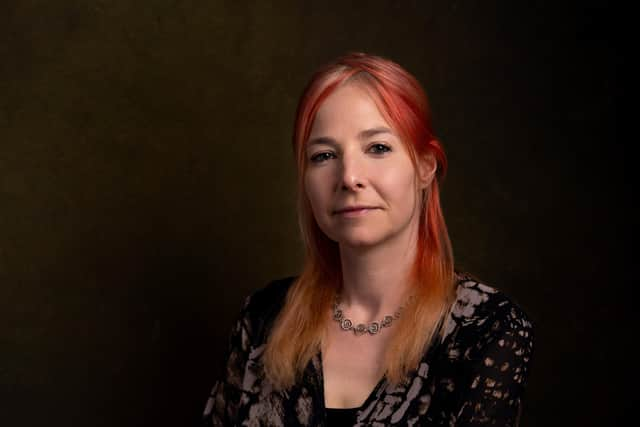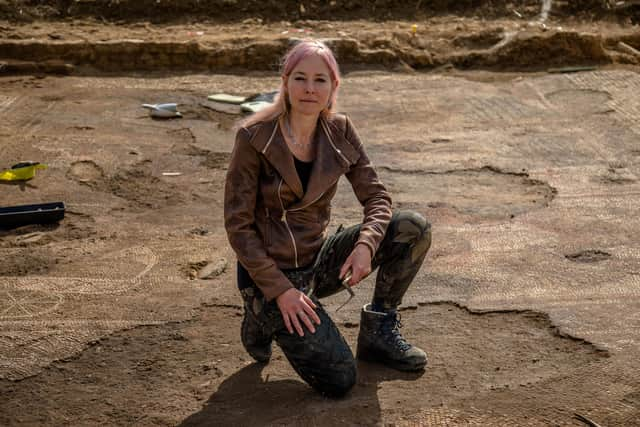Alice is digging deep to uncover the story of our ancestors through time


Speaking via Zoom she said that she gets a real sense that, after a challenging few years because of the Covid pandemic, things are starting to get back to normal.
Roberts, an academic, author and well recognised broadcaster thanks to the popular BBC TV series Digging for Britain, she has specialised in human anatomy, physiology, evolution, archaeology and history. Her visit to Northern Ireland is part of promotion for her new book Ancestors: A Prehistory of Britain in Seven Burials.
Advertisement
Hide AdAdvertisement
Hide AdShe said: “I was last over in Belfast in 2020 just before the first wave of the pandemic. I love coming over to the NI Science Festival, it is such a bright and vibrant festival, and it is always great fun and there are always fantastic audiences.


“Above all it will be great to be back doing a live talk again. It will be wonderful to talk to people without using Zoom or virtually, but to be in front of an audience.”
I asked her about the importance of the NI Science Festival in getting the message of science across to a much wider audience.
“I think they are incredibly important,” said Alice. “It is also a very joyful way of communicating science.
Advertisement
Hide AdAdvertisement
Hide AdShe added: “I think that over the pandemic we have seen that in order to make decisions for ourselves and to contribute to decision making in a democracy, we have to have a certain level of scientific literacy.
“Even though you may not come along to a festival thinking that you are going to improve your scientific literacy, you will do just that by listening to ever is giving a talk. It is like a muscle I suppose, the more that you exercise your brain in a scientific and logical way the more you will improve your thinking.
“Science is part of our culture, it is not a separate thing and I think you get to see that in the likes of the NI Science Festival and others around the country, where it feels like a big cultural explosion.”
Alice believes that we have not seen the end of the growth of the NI Science Festival.
Advertisement
Hide AdAdvertisement
Hide AdShe said: “The people who create the festival are just brilliant at what they do, they are a fantastic team who are very enthusiastic.
“But I also I think people are fascinated in science, people are interested and there is great public appetite for a festival like the one in Belfast.
“I certainly don’t believe that we have seen the end of the growth of the festival, I expect that this year’s one will be even bigger than those which have gone before it.”
Dr Janina Ramirez a British art historian, cultural historian, and fellow TV presenter, has described Roberts’ book Ancestors: A Prehistory of Britain in Seven Burials thus: “This is a book everyone should read. Roberts is the new Da Vinci, able to shift between science and humanities, the objective and subjective, the global and the individual. . . A mind-altering, life-altering book.”
Advertisement
Hide AdAdvertisement
Hide AdAlice explained: “My book Ancestors is a prehistory of Britain and Ireland through seven burials which take the reader on a journey through time.
“They include some iconic burials, such as the Red Lady of Paviland which was discovered in 1823 by William Buckland in South Wales, which is the oldest burial to have been found in the whole of these islands.
“It was a very personal selection for me as they are burials that have had the honouring of looking at across my career. But they tell a very interesting story I think, it is a different way of approaching prehistory as it allows us to focus in on an individual and at a particular time, it really interrogates what you can find out from the individual from their bones, for example what biological information that we can extract.
“And then if there are any artefacts associated with that burial these are very special. These items aren’t from rubbish tips.
Advertisement
Hide AdAdvertisement
Hide Ad“These items have held meaning for the people who are placing them in the burial.”
Returning to the Red Lady of Paviland, Alice added: “Interestingly, she isn’t a woman after all but a man, the burial was thought to have been a woman’s back in the 19th century and it has stuck ever since. But if we look at his grave he was buried with many ivory objects and also red ochre, which is obviously a pigment but we are not sure if it was on the clothing or used in dying the fabric or painted on his skin or if it was just scattered into the grave when the burial was happening. But that has obviously had some meaning.
“What is interesting is that we see similar burials right across Europe at this time, so it appears that we have a community or culture that stretches across Europe which I find absolutely fascinating and that burial dates to over 30,000 years ago and dates it back in the Ice Age.
“The aim of the book, through looking at each individual burial, is to make you feel like your in fact meeting each of these people from the past, finding out about their lives.”
Advertisement
Hide AdAdvertisement
Hide AdAncestors: A Prehistory of Britain in Seven Burials with Alice Roberts will be held in the Whitla Hall at Queen’s University on Sunday, February 20 between 3.30 and 5pm. Tickets are availalble priced £14 or £12 for concessions from the festival website at: https://nisciencefestival.com/